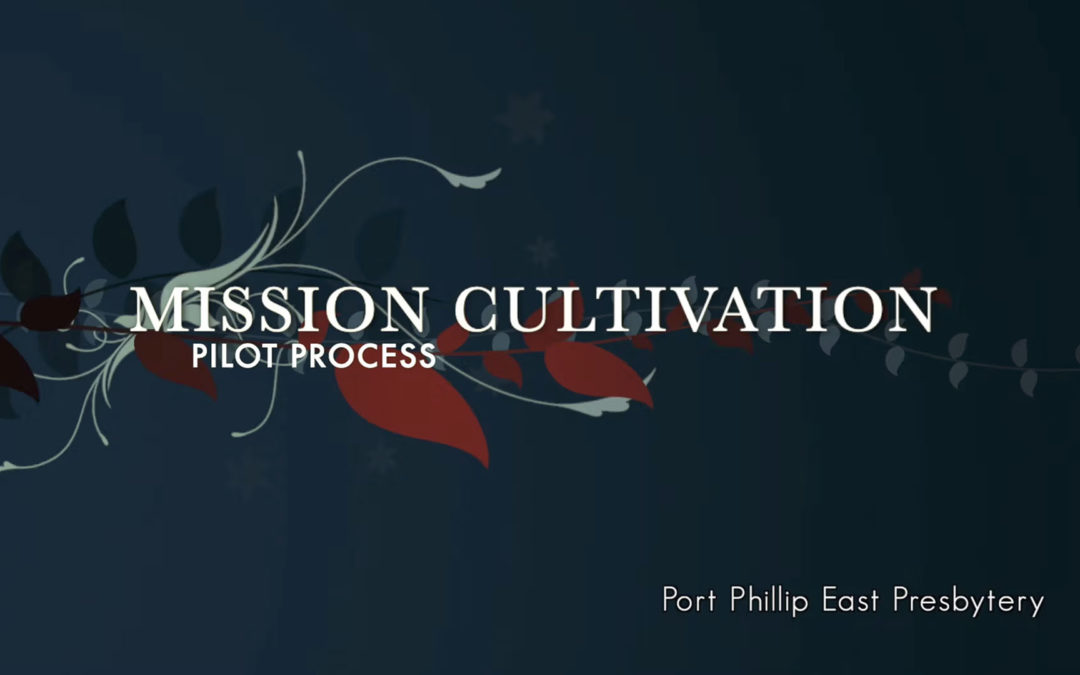Mission Pilot Launch from Craig Mitchell on Vimeo.
In 2020 Port Phillip East Presbytery we commenced a Mission Pilot Process, part of a significant cultural change process within the presbytery called “Cultivating our Future” facilitated by Phil McCredden from Ecclesia Leadership whom you’ll see in this video.
Broadly speaking, the goals were:
- to design a process to assist and support congregations to respond to the challenges of the post-Christendom missional context
- to give tools to the pilot congregations to help them discover how to be the people of God together in this new context
- to identify and improve methods in which the Presbytery can support congregations wishing to embark on this journey
 From the brochure:
From the brochure:
The Mission Cultivation Process is a twelve-month process for congregations to learn about new ways of being in mission through action learning – taking on a new initiative and learning from the experience.
The Port Phillip East Presbytery Cultivating a New Future Process includes a strategic priority to develop a small number of Congregational Mission Pilots in 2019 and 2020. This involves a process of missional cultural change designed to assist congregations to respond to the challenges and opportunities of the post-Christendom context in Australia.
The Presbytery is seeking to identify three congregations for this first round of mission pilots, with subsequent rounds from mid-2020. Congregations are invited to submit expressions of interest to participate in the project by 31 August, 2019.
Here’s the A4 version of the supporting documents. DOWNLOAD MISSION PILOT PROSPECTUS
Two congregations commenced the process at the beginning of 2020. I will be posting about the development and evaluation of the project. From the outset, it needs to be noted that the work with the congregations commenced just prior to the onset of the Coronavirus Pandemic.
The project had two foci – Mission Experiment (a practical local mission project) and Mission Posture (seeking in influence the stance of the congregation in relation to local mission). This involves three phases:
- Discern – seeking to engage with the local community in fresh or deeper ways, build relationships, and discern with whom God is calling us to be in mission.
- Design – engaging with a particular group of people to begin to shape what ‘being in mission’ with them might look like
- Develop – shared action to evolve the mission experiment as a practical project
Project Implementation
The Project involved teaching, coaching, and action-reflection learning. Each congregations appointed a Mission Team which included the minister in placement.
- Intensives – Three teaching intensives. An initial residential weekend and two Saturdays during the year.
- Coaching – Monthly coaching meetings with each Mission Team.
- Coaching Group – The coaches met monthly with Phil McCredden as a reflective practice group.
- Action-Learning – The teams were encouraged to be active throughout the process, with the coaching and Intensives designed to assist with action-reflection.
- Ministers’ Peer Learning Group – The ministers were to meet every two months with me to reflect together on their roles and learning, however with COVID and other issues, this proved to be too much. Instead, the ministers became involved in occasional meetings with the coaches.
- Learning Resources -Team members were also provided with journals to assist their reflection and discernment. Readings and audio-visual materials were also used.
In addition to the above, the Steering Group met monthly, and the Project Manager (Craig) and Consultant (Phil) met once or twice a month.
Much information to come in further posts.
